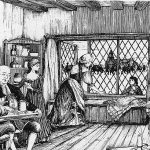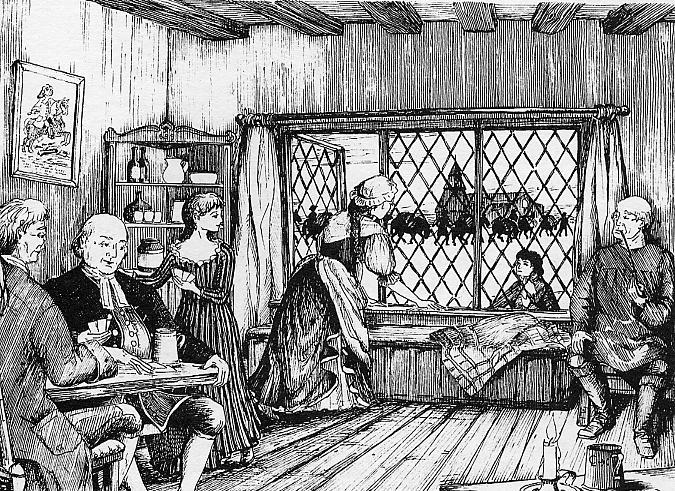Reproduced from “Gentle Breezes”
Kent and Sussex were hot beds of smuggling for centuries, and to judge by reports, still are. Originally, wool was smuggled out to France, rather than other goods coming in. The reason was that we produced high quality wool, but had not the means of processing it. The French and Dutch did. In 1622, it was made a hanging offence to smuggle out wool. The government then imported French and Dutch weavers and other trades to process the wool. That is why we have many large houses of Dutch style in our area. Many parishes have their Cloth Halls, The Weavers, and so on.
These wool smugglers were known as “Owlers”. The name may be derived from wool or from their habit of working mainly at night-you take your choice.

Trotting through the dark-
Brandy for the Parson,
‘Baccy for the clerk-
Laces for a lady, letters for a spy,
Watch the wall, my darling, while the Gentlemen go by!
Eventually, wool smuggling, not so profitable, as it was processed here, so the better known goods such as brandy, silks and wines came in. Many people were involved. The gangs would hire people to move the goods from boat to store just for the night. The going rate of pay was 7/6d per night. If you were willing to act as a guard to clobber the Revenue men with a club, known as a bat, you were paid a guinea. These guards were known as “batsmen”.
Churches and other premises were used as stores. The George Inn near Lydd church was a favourite. The Mermaid Inn in Rye was another, as was the church. The gangs used the inn for drinking, and would have pistols on the table in case the magistrates came in.
A man named Carter spent many years catching smugglers on the marsh, but very rarely got a conviction. He complained that the magistrates were in on the act. Geoffrey Chaucer was a Customs man for the Port of London, looking after wool, leather and fells. He fell out of favour, though as he was not too energetic in his duties, and hired a deputy to do most of the work. The two were on the make, and lost their jobs. Chaucer then concentrated on writing the Canterbury Tales. He was born in Kent.
Windmills were often used as stores, as the miller could hide contraband in bags of flour or grain or corn bins. Wagons going to and fro from a mill aroused little suspicion. The sails of a windmill could be used to give signals as to whether the coast was clear, by positioning them in different attitudes like a semaphore.
Many gangs had names, such as the Hawkhurst Gang, the Aldington Gang, and the Callis Court Gang. They were rarely interfered with, as they were so ruthless. Oppose them, and you were likely to die. The location name in their title did not necessarily mean that they stuck to that area. The Hawkhurst Gang were just about the most ruthless. The Callis Court gang were based in Broadstairs, and run by Joss Snelling, from whom Joss Bay got its name. The tunnel from the beach to Callis Court was dis co ve r ed in 1954, when a bulldo z e r fe ll through the roof. Snelling survived many skirmishes with the Revenue men, backed up by soldiers, although many of his men died or were captured. Snelling was fined £100 for smuggling at age 90, and was presented to Queen Victoria, as a smuggler when she visited Broadstairs. He died at the age of 96.
Present day smuggling may not have quite the “glamour” of those days, but is still a quite large industry. Some of the old items are still smuggled, such as tobacco and booze, but people smuggling has taken a much more prominent place. This was only a minor trade in the old days, when spies, French aristocrats, fugitives from the law (on both sides of the Channel) were a useful source of income. If they did not pay, they could easily be dumped over the side in mid Channel. Some of today’s people smuggling gangs are just as tough.
Rye’s Own January 2013
All articles, photographs and drawings on this web site are World Copyright Protected. No reproduction for publication without prior arrangement. © World Copyright 2017 Cinque Ports Magazines Rye Ltd., Guinea Hall Lodge Sellindge TN25 6EG
